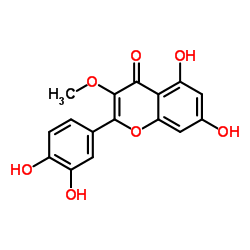Role of quercetin and its in vivo metabolites in protecting H9c2 cells against oxidative stress.
C Angeloni, J P E Spencer, E Leoncini, P L Biagi, S Hrelia
文献索引:Biochimie 89(1) , 73-82, (2007)
全文:HTML全文
摘要
The aim of this study was to investigate the potential of quercetin and two of its "in vivo" metabolites, 3'-O-methyl quercetin and 4'-O-methyl quercetin, to protect H9c2 cardiomyoblasts against H(2)O(2)-induced oxidative stress. As limited data are available regarding the potential uptake and cellular effects of quercetin and its metabolites in cardiac cells, we have evaluated the cellular association/uptake of the three compounds and their involvement in the modulation of two pro-survival signalling pathways: ERK1/2 signalling cascade and PI3K/Akt pathway. The three flavonols associated with cells to differing extents. Quercetin and its two O-methylated metabolites were able to reduce intracellular ROS production but only quercetin was able to counteract H(2)O(2) cell damage, as measured by MTT reduction assay, caspase-3 activity and DNA fragmentation assays. Furthermore, only quercetin was observed to modulate pro-survival signalling through ERK1/2 and PI3K/Akt pathway. In conclusion we have demonstrated that quercetin, but not its O-methylated metabolites, exerts protective effects against H(2)O(2) cardiotoxicity and that the mechanism of its action involves the modulation of PI3K/Akt and ERK1/2 signalling pathways.
相关化合物
| 结构式 | 名称/CAS号 | 分子式 | 全部文献 |
|---|---|---|---|
 |
3-O-甲基槲皮素
CAS:1486-70-0 |
C16H12O7 |
|
Antiherpes Activity and Skin/Mucosa Distribution of Flavonoi...
2015-01-01 [Biomed Res. Int. 2015 , 238010, (2015)] |
|
Biologically active constituents of Centipeda minima: isolat...
1985-09-01 [Chem. Pharm. Bull. 33(9) , 4091-4, (1985)] |
|
Isolation of flavonoids and a chalcone from Helichrysum odor...
1989-01-01 [J. Nat. Prod. 52(3) , 629-33, (1989)] |
|
Neuroprotective effects of antioxidative flavonoids, quercet...
2003-03-07 [Brain Res. 965(1-2) , 130-6, (2003)] |
|
Quercetin-3-methyl ether suppresses proliferation of mouse e...
2012-02-01 [Carcinogenesis 33(2) , 459-65, (2012)] |